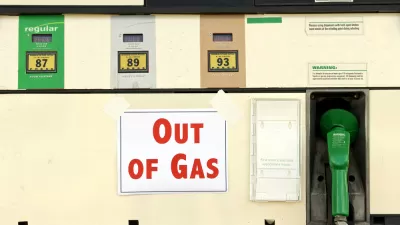This has been an eventful week for gas taxes. To update two posts that appeared recently, Gov. Terry Branstad of Iowa signed legislation that increases the gas tax by 10-cents on March 1. In California, a board voted to decrease the tax by six cents.
Gov. Branstad, a Republican, wasted no time is signing the bipartisan 10-cent gas tax increase legislation that passed the General Assembly on Tuesday. He signed it Wednesday, so the increase goes into effect Sunday (March 1) as the bill stipulated. The gas tax will increase from 22.5-cents per gallon, not changed for over a quarter of a century, to 32.5 cents. The average state gas tax in the United States is 27.66 cents.
The additional tax will "generate $215 million annually to address critical road and bridge improvements," wrote Rod Boshart for KCRG ABC News.
Mark Tauscheck of KCCI Des Moines writes that motorists may not necessarily see the tax increase at the pumps on Sunday as fuel that is currently in station tanks need not be taxed. He explains that aspect of the tax increase in greater detail in the video.
The news was not good for transportation officials in the Golden State, though no doubt many motorists will be pleased. As posted last week, the state Board of Equalization (BOE), tasked with keeping tax revenue equivalent to the 8 percent sales tax that existed prior to the complicated 2010 gas tax swap, voted on the decrease, though the amount was reduced from what was initially indicated.
Adam Randall of the (Ukiah) Daily Journal does an excellent job of explaining the six-cent decrease to the current 36-cent gasoline excise tax resulting from Tuesday's unanimous vote by the BOE. The decrease tax effect on July 1.
California has the second highest gas tax after Pennsylvania (due to the Pa. 2013 gas tax legislation). On July 1, it will likely drop below New York, Hawaii, and Connecticut to the fifth highest in the nation. [See Nebraska's chart (PDF) that ranks total state gas taxes from highest to lowest based on the American Petroleum Institute's tax information.
No sooner had Branstad signed the bill than he announced that the stalled Highway 20 project would now be "fast tracked."
FULL STORY: Iowa gas tax increase will start this Sunday

Alabama: Trump Terminates Settlements for Black Communities Harmed By Raw Sewage
Trump deemed the landmark civil rights agreement “illegal DEI and environmental justice policy.”

Study: Maui’s Plan to Convert Vacation Rentals to Long-Term Housing Could Cause Nearly $1 Billion Economic Loss
The plan would reduce visitor accommodation by 25% resulting in 1,900 jobs lost.

Why Should We Subsidize Public Transportation?
Many public transit agencies face financial stress due to rising costs, declining fare revenue, and declining subsidies. Transit advocates must provide a strong business case for increasing public transit funding.

Paris Bike Boom Leads to Steep Drop in Air Pollution
The French city’s air quality has improved dramatically in the past 20 years, coinciding with a growth in cycling.

Why Housing Costs More to Build in California Than in Texas
Hard costs like labor and materials combined with ‘soft’ costs such as permitting make building in the San Francisco Bay Area almost three times as costly as in Texas cities.

San Diego County Sees a Rise in Urban Coyotes
San Diego County experiences a rise in urban coyotes, as sightings become prevalent throughout its urban neighbourhoods and surrounding areas.
Urban Design for Planners 1: Software Tools
This six-course series explores essential urban design concepts using open source software and equips planners with the tools they need to participate fully in the urban design process.
Planning for Universal Design
Learn the tools for implementing Universal Design in planning regulations.
Smith Gee Studio
Alamo Area Metropolitan Planning Organization
City of Santa Clarita
Institute for Housing and Urban Development Studies (IHS)
City of Grandview
Harvard GSD Executive Education
Toledo-Lucas County Plan Commissions
Salt Lake City
NYU Wagner Graduate School of Public Service





























